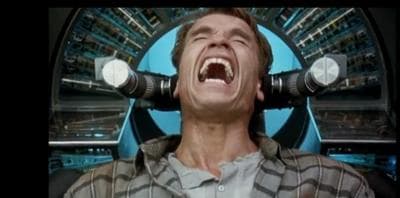Advertisement
'Total Recall' For Mice: Scientists Implant False Memories

In "Total Recall," Arnold Schwarzenegger's best film ever (in my humble opinion), he plays a construction worker who seeks a "memory implant" from a company that provides them to customers who want a false memory of a wonderful vacation they can't afford to take.
That's just the beginning of the complex plot, based on the ingenious Philip K. Dick's "We Can Remember It For You Wholesale," but of course I thought of it immediately when I saw this major memory news out of MIT in the journal Science:
Researchers at the RIKEN-MIT Center for Neural Circuit Genetics and MIT's Picower Institute for Learning and Memory have implanted false memories into mice, potentially illuminating the mechanisms underlying the human phenomenon of "recalling" experiences that never occurred.
In previous work, the researchers had detected a single memory in the brain, genetically tagged the brain cells housing that memory with a light-sensitive protein, and flickered pulses of light to "turn on" the memory at any given moment. The latest work, to be reported in the journal Science, tinkers with that memory to change its contents—in essence, creating a false memory.
Mars, here I come. (Schwarzenegger's character signs up for a Mars vacation implant.) Actually — sigh — I doubt we'll be implanting false memories of Mars trips any sooner than we get to Mars for real. But this new work does have more immediate implications for the study of how we make memories — including how we seem to remember things that never actually happened.
For more on how the experiment was conducted, read the Globe's Carolyn Johnson's excellent report here. I spoke with Susumu Tonegawa, the MIT brain scientist and Nobel laureate who led the work, about what it could mean. Our conversation, lightly edited:
So in what way is this experiment a "first"?
This is the first time a study allowed for the making of animal models of human false memory.
We knew that false memories existed in humans. So this is the first time that it’s been shown in animals that it’s possible to create a false memory and manipulate it?
Advertisement
That’s exactly right — and that’s important because in humans, all false memory has been studied by psychology. But the human studies had a lot of limitations in terms of understanding what’s going on in the brain. So an animal model is very important.
How would you describe the implications of these animal findings for humans?
First, in terms of practicality, I think we’ve shown how easily false memory can be formed. And also, in terms of underlying brain mechanisms, we have demonstrated that the mechanism for forming false memory is virtually identical to the mechanism underlying the formation of real memory.
So in a practical sense, we have to be very aware that human memories can be very unreliable under certain conditions.
Therefore, in court, evidence heavily relying on testimony of victims and other people should be considered very carefully. That’s a strong warning to society…We have demonstrated that false memory is formed using a mechanism that’s very similar to the mechanism underlying real memory. So this is a point that we should be very aware of, and try to incorporate that fact into the legal system.
And since the mechanisms are so similar it may be difficult to distinguish between real and false?
That’s it exactly. People who have made false memories have been convinced what they're saying is true — it’s something they really experienced, because there’s no way to distinguish, for this person, between false and real memory.
In this experiment, you used a technique called optogenetics that involves genetic manipulation and that we won't be using in humans any time soon, right?
Right, we don't use it in humans.
But is there any possible application for manipulating memory in humans?
This, I do not want to explore myself…There are real ethical issues about whether it is allowed in human society, where someone can change someone else’s mind. So this is not something we are pursuing. Now, there are cases where I would imagine a method like this could potentially become useful in order to reduce or cure psychiatric diseases — it’s possible in the future. What we’ve learned in the animal model may be applicable for therapy. But I don’t intend to be science-fictional, or change normal people’s minds with this kind of technology.
What's your next step?
The next step is that we’ll try to understand exactly how memory works, including false memory. In our study in the mouse system, it turned out that false memory and real are competing with each other. That’s a part of our results. So certain conditions suppress false memory and make real memory much stronger; under other conditions, the false memory may take over. So now that we have a mouse system, we can try to find out all these different factors that affect the strength of false and real memory.
Readers? Thoughts on false memories?
This program aired on July 26, 2013. The audio for this program is not available.
